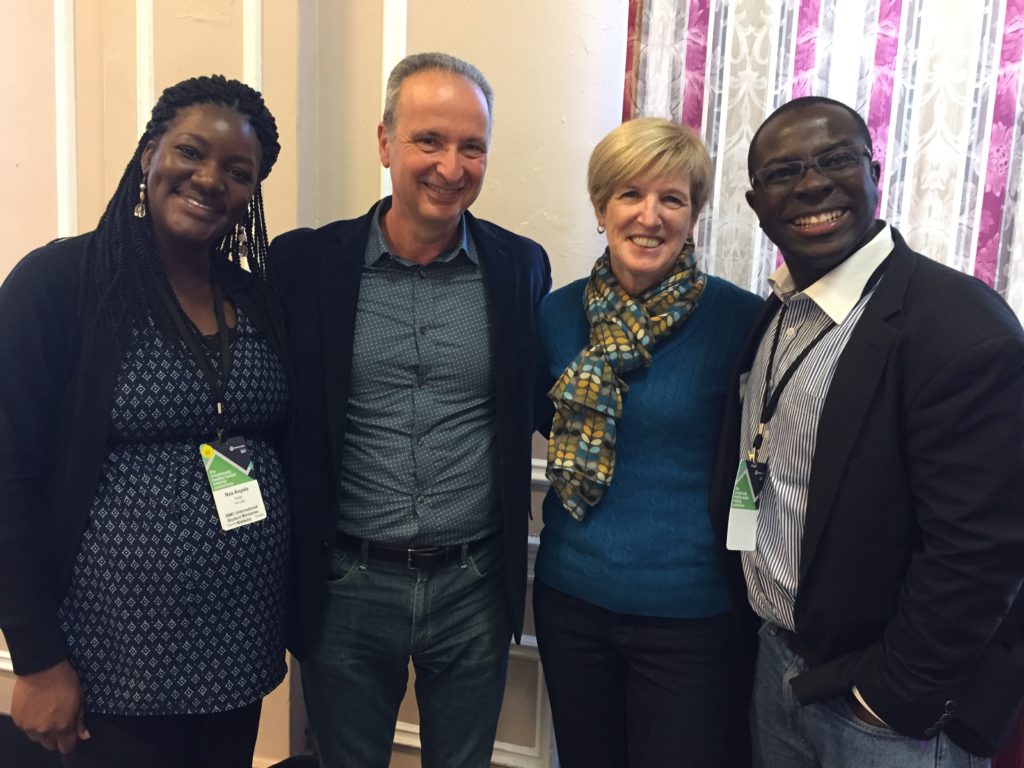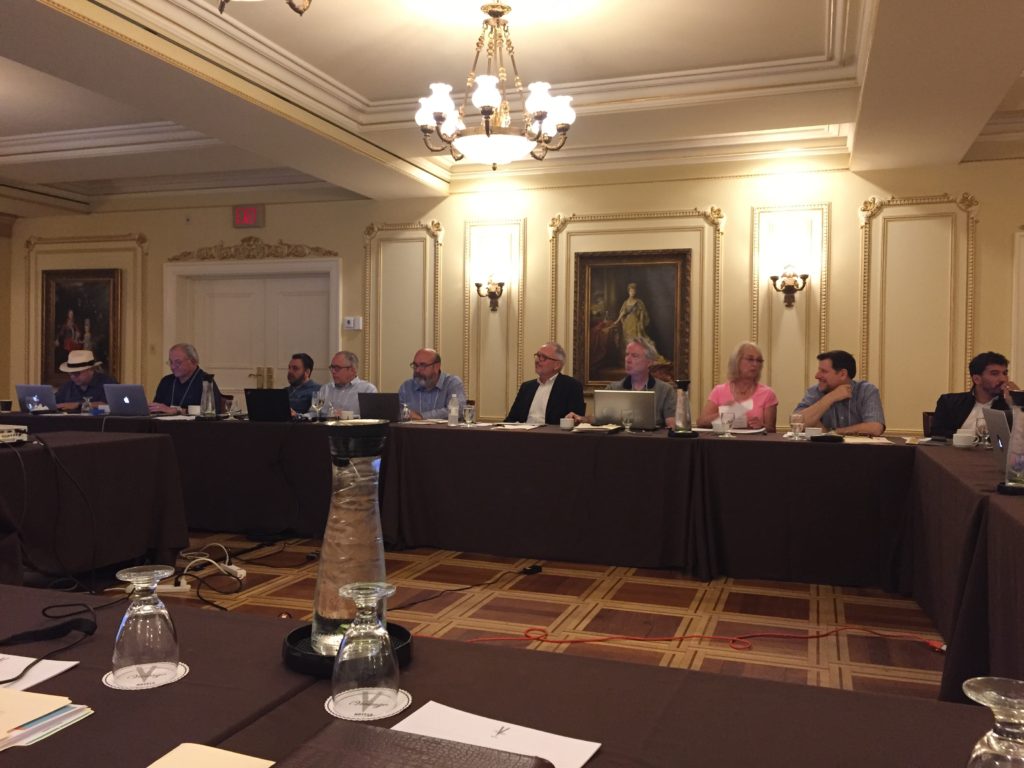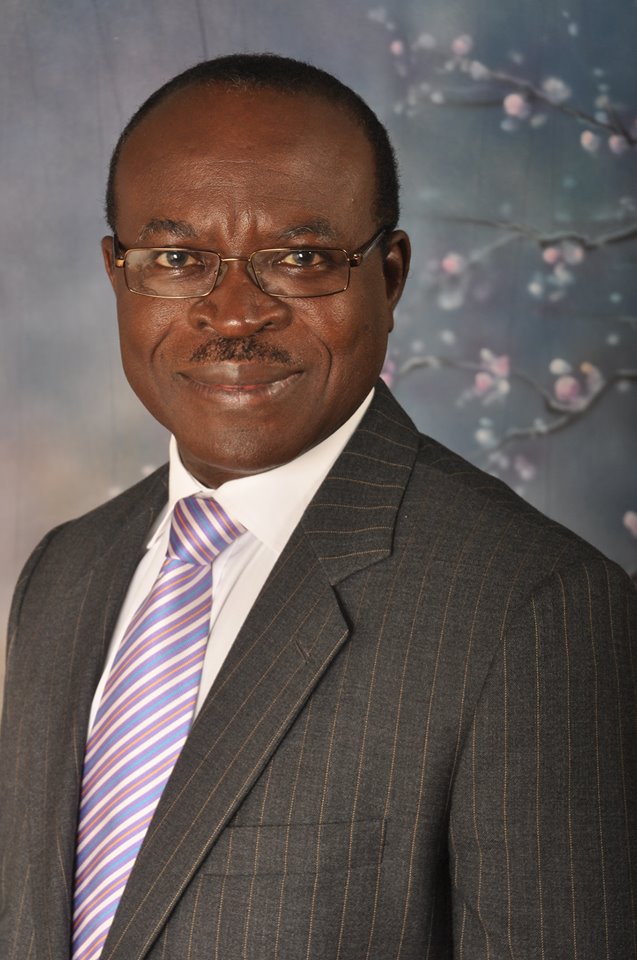What Transpired in Court: a Blow to Blow Account
The day after my trial I sent a newsletter to all my family, friends and ministry partners around the world who had been praying for righteousness, truth and justice to prevail, giving them a ‘blow to blow’ account of happenings on that eventful day, November 28, 2018. You may read it here. Acquitted! Discharged!! Free!!!
I Stand Trial Today.
“Now I am on trial because of my hope in the fulfillment of God’s promise made to our ancestors.” ~Paul the Apostle, A.D. 62
Although the official book of the story of God has been ‘closed’ with the canonized 66 books of the Bible, God is still writing his story every day in and through our lives.
Today, November 28, 2018, I will be defending myself against three criminal charges leveled against me by one James Simon of Montreal: assault, assault with a weapon and attempting to steal his iPad. One day, not long after this trial is over and I am vindicated, God-willing, I shall tell the full story publicly. Suffice it to say I was officially served notice in September 2017 regarding a parking incident involving the two of us in May 2017 in the course of my duty as an Associate of the Christian Medical and Dental Society (CMDS). Up until last year, for about seven years I had been mentoring medical students at McGill University. Fortunately, I had two of my medical students present at the time of the alleged incident who are willing witnesses in court today.
I have asked myself several times why God would allow such a wicked triple venom to be spewed at me and how the Montreal police and Quebec judicial system could even allow these frivolous accusations to travel this far but be that as it may I have taken great encouragement from the life of one of my top three historical mentors in the Bible: Apostle Paul.
If you should ask me, it is no accident that a day before my trial I found myself in Rome of all places (for the first time in my life). While on a five-hour transit at the Leonardo da Vinci airport en route back home to Canada I felt led to take a pilgrimage to the Mamertine prison area (Carcere Mamertino in Italian) where Paul was kept in AD 64, under house arrest for two years, awaiting trial by Emperor Nero (Acts 28:30). It was from there he penned the amazing book of Ephesians. I arrived in the frigid hours of the morning and spent quality time between 6 and 7am supplicating and interceding with tears mixed with rain to Paul’s God that my trial too will be for his praise, glory and fame.
False accusation against God-followers is an old tool of Satan the adversary and “accuser of the brethren”—from Joseph through Jeremiah to Jesus. Speaking of that and Rome, that particular Mamertine prison (carcer) has held several Christians, including Apostle Peter, especially in the time of Emperor Nero who even accused Christians as being behind the ravaging July 19, AD 64 fires of Rome. Oh, the other famous accusation was that Roman Christians hated humanity (popular till date especially among humanist-secularists).
My trial was originally slated for June 2018 but had to be postponed because the police officer who took my accuser’s statement and processed the case (without ever taking my side of the story!) went on vacation! During that time in June when my lawyer pointed out the baseless nature of the accusations to the Crown prosecutor who then sought the consent of my accuser to withdraw the case the latter said “no way,” and that I had still been coming around (during a time I was away in Ghana with my family for eight months!). He supposedly added that I was dangerous and ought to “be put away!” Ha!
Back to Paul and his inspiration regarding trials. Interestingly, only two weeks ago I was in Israel (again, for the first time in my life). When I had the opportunity of a customized one-on-one tour of selected places, one of the sites my gifted Jews for Jesus tour guide, Dalia, felt strongly we should visit (and at that time the name meant nothing to me) was Caesarea Maritima. Dalia must’ve been led by God’s Spirit unbeknownst to her. I was familiar with the other Caesarea, Caesarea Philippi, where Peter had made his famous divinely-inspired confession about Jesus: “You are the Messiah, the Son of the living God.” But Caesarea Maritima, that strategic port Herod the Great built along the Mediterranean, did not ring a bell. Yet it was here that I got to walk on the very grounds of the room that Apostle Paul was kept in as prisoner two years earlier (AD 62) than the Roman incarceration while being tried by Festus and Felix (Acts 24-26). Was my pilgrimage to Caesaria Maritima an accident or a ‘God-incidence’?
God is still writing his story in the lives of his people and his earlier recorded stories are for our inspiration and instruction. Incidentally, when St. Paul wrote to the very Romans many years prior that was his exact encouragement: “For everything that was written in the past was written to teach us, so that through the endurance taught in the Scriptures and the encouragement they provide we might have hope” (Romans 15:4, NIV).
Today, I too will be standing trial, comforted by the words of Apostle Paul that, “We are hard pressed on every side, but not crushed; perplexed, but not in despair; persecuted, but not abandoned; struck down, but not destroyed. We always carry around in our body the death of Jesus, so that the life of Jesus may also be revealed in our body” (2 Corinthians 4:8-10, NIV). I am counting on Jesus, who not only knows how it feels like to be falsely accused and unfairly tried but made his followers, like me, a solemn promise: “On my account you will be brought before governors and kings as witnesses to them and to the Gentiles. But when they arrest you, do not worry about what to say or how to say it. At that time you will be given what to say, for it will not be you speaking, but the Spirit of your Father speaking through you” (Matthew 10:18-20, NIV).
In a court case I call “a bizarre cocktail of mental health, racism and spiritual warfare” I trust truth will prevail, justice will be served and ultimately God will be glorified. God is still writing his story in our lives every day, even today. And He has the last word. Be encouraged.
Emotionally Constipated
In medical school this wasn’t one of the diagnoses I was taught I could make but on the other side of the doctor’s desk, this may be an even more dire diagnosis than a clogged gut.
MAINLY MEN; BUT NOT ONLY
Last Sunday, in a suburban church in Montreal, this was the summary of the middle-aged chap who shared his life-long struggle of dealing with his past: “I don’t do emotions.” Me too! Well, no more.
In many world cultures, that is the manly thing to do; it is macho. Some women try it too 🙂 In fact, in my own language, there is a saying that, “Obarima nnsu;” to wit, real men don’t cry. Even as a little boy growing up in Scripture Union circles in Accra, I always knew there was something wrong with that statement because I considered no one more manly that Jesus Christ yet he wept. Ever since then, I haven’t had a problem with weeping (you probably have seen me weep!) but errm… not done so well with a whole range of other emotions.
FACE, FIGHT OR FLIGHT?
I still remember my rather unemotional response to one of my staff’s emotional appeal when he said, “I feel…” My immediate response was, “Good thing that it’s only a feeling; but what do you think?!…” I don’t need to tell you that conversation didn’t go very well after that.
The Lord has been particularly convicting me of my emotional immaturity since the beginning of this year. Prior to that, I was the kind of leader Ruth Haley Barton would describe in Parker Palmer’s words as having risen to leadership based on “extroversion, which means they have a tendency to ignore what is going on inside themselves. These leaders rise to power by operating very competently and effectively in the external world, sometimes at the cost of internal awareness… but the link between leadership and spirituality calls us to reexamine that denial of the inner life.” (Barton 2012, 44, emphasis mine).
In fact, I might never have picked up a book like Peter Scazzero’s The Emotionally Healthy Leader because hitherto the word ‘emotional(ly)’ anywhere put me off. But for Dallas Willard and Scazzero, I had never thought of my emotional life as specifically needing to be discipled! I certainly did not have the theological, mental or practical framework for that!
Scazzero astounded me and totally destroyed my perception of what spiritual formation consists of when he emphatically stated, “it is not possible to be spiritually mature while remaining emotionally immature!” (Scazzero 2015, 17). Gordon Smith drove the dagger deeper into my heart when he confirmed that “what is happening to us emotionally is not secondary to our spiritual experience, but may actually be—pun intended—the heart of the matter” (Smith 2014, 27).
And whole squadrons of the ancients agree, that “few things are so crucial to our growth in faith, hope and love as our capacity to be alert to the emotional contours of our lives” (28). Smith then adds another dimension, that not only are my emotions an area to be discipled for sure but they are also indicative, a dashboard sign, in the sense that “the depth of our hearts reflects the depth of our emotional lives; nothing so captures the inner recesses of our beings as what is happening to us emotionally” (28). In fact, St. Ingatius exhorts that we check for feelings of consolation and desolation in the Examen.
For all those as emotionally constipated as I used to be, we need to decide now: are we going to face our emotions, fight them or flee?
DENIAL, DISTORTION & DISENGAGEMENT
I could give myriad reasons (in addition to the couple above) why being emotionally aware and emotionally expressive in a healthy way is non-negotiable in life and leadership but just take a moment to consider why Dan Allender and Tremper Longman, in The Cry of the Soul, find this paramount:
“Ignoring our emotions is turning our back on reality; listening to our emotions ushers us into reality. And reality is where we meet God…. Emotions are the language of the soul. They are the cry that gives the heart a voice…. However, we often turn a deaf ear—through emotional denial, distortion, or disengagement. We strain out anything disturbing in order to gain tenuous control of our inner world. We are frightened and ashamed of what leaks into our consciousness. In neglecting our intense emotions, we are false to ourselves and lose a wonderful opportunity to know God. We forget that change comes through brutal honesty and vulnerability before God.”
THE DOCTOR’S DOCTOR
So where do we go from here? Personally, I have not only devoured Scazzero’s The Emotionally Healthy Leader but also led my entire ISMC national leadership team and still taking the fourteen country CEOs of The HuD Group through it chapter by chapter. At ISMC’s recent biennial national staff conference in Montreal, there was a daily ‘Emotionally Healthy’ segment (spirituality, relationship, leadership). In fact, the picture you see above was taken in May 2017, when Anyele and I had the privilege of joining the authors, Peter and Geri Scazzero, at their conference in New York (together with the CEO of The HuD Group Canada and his wife). I’m still learning and eagerly walking with a few others through Emotionally Healthy Spirituality over the next few months.
Having gleaned from Smith that “the genius of good [spiritual] direction is that we probe together, director and directee, and attend to the emotional wake that is left by the myriad of experiences we have had or are having” I have begun a search for a well-fitting spiritual director, apart from the amazing mentors, accountability partners, counselors and coaches I have in my life. And a good practice, encouraged by my wife, has been to “name my feelings,” because “what you name you can tame.”
How about you? Could you too be suffering from emotional constipation? What may God be calling you to do about it? Take a personal Emotional Healthy Spirituality assessment here. Don’t be afraid or ashamed to admit your state of emotional immaturity or bankruptcy, because hey, “God blesses those who are poor and realize their need for him, for the Kingdom of Heaven is theirs.”
Other Works Cited
Barton, Ruth Haley. 2012. Pursuing God’s Will Together. Downers Grove, IL: IVP.
Scazzero, Peter. 2014. Emotionally Healthy Spirituality Day by Day. Grand Rapids, MI: Zondervan.
Scazzero, Peter. 2015. The Emotionally Healthy Leader. Grand Rapids, MI: Zondervan.
Willard, Dallas, 2002. Renovation of the Heart: Putting on the Character of Christ. Colorado Springs, CO: NavPress.
Leadership is Likadis Likadat
The idea of ‘leadership ellipse’ is perhaps the most striking leadership concept I’ve come across most recently. How in the world is one supposed to ‘balance’ the inner spiritual life and the outer demands of leadership and tame tensions like being in the world but not of it, faithfulness and fruitfulness, impact and profit, being and doing… and remain sane?!
LIKAWHAT?
So after paying lots of money to take a course in Mentoring these were among the final words of admonishing (from Dietrich Bonheoffer): “Let him who cannot be alone beware of community” and “Let him who is not in community beware of being alone.” Huh? Now, which is which? Give me back my money! LOL!
Welcome to the business of life and leadership–paradox and ambiguity. To live in one extreme or the other is the easy option (any ‘fool’ can, excuse me to say); but to be able to hold two extremes in balance in your head, heart and in life is the real deal and few are able to handle this well. Yet that is an essential ingredient for success. In fact, sometimes these apparently contrasting dimensions of life are not even to be balanced per se but to be continually held in tension. To be comfortable with the uncomfortable tension and do well therein, that is the issue!
Pursuance of a life and leadership of integrity is living as activists and contemplatives, following and leading, managing our outward leadership responsibility and inward spiritual reality as well as having external organizational success principles and internal spiritual disciplines jiving. Robert Fryling, in his insightful work, The Leadership Ellipse, brings these to the fore and challenges leaders to integrate our lives in the sense of one’s outer and inner worlds being one, synchronous. Fryling’s metaphor to describe a life holding these foci and tensions together is the ellipse.
CALL IT WHAT YOU MAY—BUT IT’S THERE!
Why does Fryling use the ellipse (an elongated circle) metaphor and how useful is that in all the cross-cultural contexts in which I serve? I ask because there are too many times when one is caught off guard trying to use a metaphor (like ‘snowball effect’) that does not cross cultures well. I don’t want a situation of trying to relate a concept that I appreciate so well from a Western context but struggle to transmit.
Fryling’s love for, and deep understanding of, geometry led him to employ this amazing metaphor because an ellipse “is defined by two distinctly different focal points that are of equal importance. One point is not inferior to the other, and both are needed if there is to be an ellipse.”
For Fryling, “one focal point is our inner spiritual life, our longings, our affections and our allegiance to God. The other focal point is our outer world and organizational life, what we do and how we do it. Together these focal points define an ellipse that circumscribes our true spiritual leadership. It represents the dynamic tension between our soul and our actions, and gives us a mental image for personal, spiritual and professional integrity in who we are and how we lead.”
While almost every schooled person, irrespective of culture, may ‘get it,’ I’m glad he uses other metaphors which everyone can appreciate, like form and freedom, the fixed bone structure and flexible muscles of the human body plus basic theology of the full humanity and full divinity of Jesus Christ.
PREDICTOR OF LEADERSHIP SUCCESS
This sense of dissonance between a leader’s outer world and inner world is normal. “We live with paradoxes all of the time,” says Fryling; even Jesus the ultimate leader wasn’t spared. His prayer for his followers was “to live in the world without at the same time being of the world.” In many ministries, like mine, there is a constant struggle between being faithful and being fruitful.
Those are leadership ellipses right there when “waiting on God to move or to shift something inside me while at the same time still needing to lead in the public arena” (Ruth Haley Barton). In fact, Barton goes on to mention how “we might notice tension between what the spiritual life requires and what it takes to be (or at least appear!) successful in the current cultural milieu. On our good days, we might experience these tensions as a place of paradox where creative solutions might be found, but on other days they feel like polarities that are impossible to manage.”
In rapid fire, she continues: “…there is real tension between what the human soul needs in order to be truly well and what life in leadership encourages and even requires. There is the tension between being and doing, community and cause, truth-telling and putting the right spin on things. There is the tension between the time it takes to love people and the need for expediency. There is the tension between the need for measurable goals and the difficulty of measuring that which is ultimately immeasurable by anyone but God himself.
“There is the tension between the need for organizational hierarchy with all the power dynamics this creates and the mutuality and interdependence of life in community to which we as Christians are called. There is the tension between knowing how to “work the system” and entering into trustworthy relationships characterized by trust and a commitment to one another’s well-being. There is the tension between the need for an easy discipleship process through which we can efficiently herd lots of people and the patient, plodding and ultimately mysterious nature of the spiritual transformation process. And there is the challenge of knowing how to speak of these things in fruitful ways in the very inside places of power without becoming polarized in our relationships with one another.” Phew!
INTEGRITY AGAIN!
Living in the tension of this and that, yin and yang, and learning to be comfortable in the space and place, while taming the tension has a lot to do with living a life of integrity. Remember, integritas is about being one whole (integers); not fractionated. And it’s hard.
My seminary president put it this way in his book, Called: “Authentic discipleship delivers us from a compartmentalized life. Rather than having a life with segments and partitions—divisions between sacred and secular, personal and public, image and reality—we’re called to one whole and integrated life. It has to be said, of course, that we usually don’t want such a life and prefer the separate compartments. Such divisions provide room for our conflicting and contradictory instincts and desires. This is how we try to manage our several selves. It’s the hedge-your-bets approach to life, highly appealing but ultimately disappointing. It’s like approaching life as a series of snacks rather than committing ourselves to a full meal” (Mark Labberton).
GAME ON
Fryling, Barton, Labberton, Scazzero and others have assured me that the paradoxes and tensions that I sense as a leader are not only real but normal…and can be successfully grappled with. I’m more willing to embrace elliptical leadership. How about you?
After studying several leaders I have come to the conclusion that the degree to which one is able to be comfortable with and live, love and lead well in the tension of this and that, yin and yang, determines their ultimate leadership success or otherwise. From my little experience and research, the best leaders in the world are those who are not only able to get comfortable with being uncomfortable living in such tensions but mastered the art of dexterously handling both well.
As long as we are alive we will live with ambiguity and grapple with paradox. Part of our discipleship—learning to live and lead like Jesus—is to master how he lived his elliptical leadership life as the God-Man, knowing it can be done; and it must be done.
Works Cited
Barton, Ruth Haley. 2008. Strengthening the Soul of your Leadership. Downers Grove, IL: InterVarsity Press.
Fryling, Robert. 2010. The Leadership Ellipse: Shaping How We Lead by Who We Are. Downers Grove, IL: InterVarsity Press.
Labberton, Mark. 2014. Called: the Crises and Promise of Following Jesus Today. Downers Grove, IL: InterVarsity Press.
I DON’T CARE HOW GOOD YOU ARE (#2)~If you’re not a ‘walkie-talkie’
When “what people say, what people do, and what they say they do are entirely different things” (Margaret Mead) we’re in real trouble. On this Father’s Day, I want to honour the one person, of all the leaders I know in this world, who I can vouch for as walks his talk: my own father.
WHO SAID WHAT?
In my head I was debating whether or not to continue this “I Don’t Care How Good You Are” series on character, ethics, morality and integrity when I chanced upon an quote from the newly-launched book of a dear family friend (actually my Dad’s Best Man nearly 40 years ago!): “What a person truly believes isn’t what they think or say, it’s what they do” —Queenie in Lark Rise to Candleford. That was it; that was my confirmation to do this piece. So let’s roll with another in this character series. But this one is very special because it is dedicated to my own biological father.
In many places and pieces of literature, even in Scripture, the life we lead is often referred to as our “walk.” Let’s examine what it means when our talk (what we say we believe in, who say we are or what say we do) doesn’t match our walk.
WHY DAD?
If there ever was a man of integrity I could vouch for it is my father: Reindorf Kofi Baah Perbi. In fact, even way back in the 1980s during his days as Chief Accountant at the then Social Security Bank (now SG-SSB), when his signature was forged and monies stolen it was his integrity that saved him. Everyone vouched for him: “Chief would never do such a thing,” the convincingly told the authorities.
Those were the heady days of revolution and military rule in Ghana so he had even received a pre-judicial slap or two already when he was picked up by soldiers and sent to Gonja Barracks. After several weeks of tribunal hearings (and I remember us going to fetch him from tribunal hearings after we had been picked up from Ridge Church School), eventually, the perpetrators were found, tried and shot via firing squad. It was no joke. One of them, I believe, is still on the run—he must be still running now or dead from running.
When Dad retired as Ghana’s Deputy Senior Partner of KPMG (one of the ‘big four’ accounting firms in the world) in April 2015, it was humbling to hear how many of his accounting, management consulting, and audit colleagues honoured him for this one thing: integrity. I sat at those banquets (yes, there was more than one! Lol!) soliloquizing, “I want that. When all is said and done, that’s the kind of man I want to be!”
LAYING IT DOWN
Contrast Dad with Kenneth Lay, who was the CEO of Enron. He played a leading role in the corruption scandal that led to the downfall of the Enron Corporation. Unfortunately, Lay and Enron have become synonymous with corporate abuse and accounting fraud since the scandal broke in 2001.
In an interview with the indefatigable Larry King of CNN, after pleading not guilty to criminal counts having to do with his leadership at Enron, these were Mr. Lay’s words: “I lived my life in a certain way to make sure that I would never violate any law – certainly not criminal laws – and have always maintained that most important to me was my integrity, my character, and my values.”
Something doesn’t add up here because in 2004, Lay was indicted on 11 counts of securities fraud and related charges. He was found guilty on May 25, 2006, of 10 counts against him which meant he could face anything from 20 to 30 years in jail. However, only three-and-a-half months before sentencing, Kenneth Lay died of a heart attack while vacationing.
Same thing with Bernie Madoff who founded a Wall Street firm in 1960 of which he was chairman until his arrest on December 11, 2008. He would soon plead guilty to 11 felonies, having turned his wealth management business into a massive Ponzi scheme with almost $65 billion of fabricated gains. Yet hear his defense attorney, Daniel Horowitz: “…Bernard (Bernie) Madoff is a longstanding leader in the financial services industry. He will fight to get through this unfortunate set of events. He is a man of integrity.” Madoff is currently serving a life term in a federal prison for his kind of integrity.
STRANGE ANIMAL
Did you not just read Mr. Lay saying integrity was most important to him? In my short life, perhaps there is no word I’ve found more misunderstood and misappropriated than the word, “INTEGRITY.”
Integrity comes from the Latin root integritas, which means entire or whole. It’s the word from which we get “integer” in Mathematics. It may help to remember that integers are positive or negative whole numbers. To have integrity, therefore, means you are whole, you are one: your private and public lives are one; your charisma and character jive; what you say and what you do are in sync.
Extending the Math metaphor, a life of no integrity on the other hand is fractionated—instead of integers, we have fractions. That is when the Yaw you see behind the pulpit is different from the Yaw you see at the pub; and different from the Yaw you experienced on vacation in Panama; who is also very different from the Yaw at home… Sadly, not too long ago even a pastor whose public image did not match who he truly is was exposed on CNN.
THE ONLY TIME I BELIEVE IN ATHEISTS
When it comes to integrity, I dare say that many non-religious people, even atheists, have more integrity than many so-called religious people. This is what I mean. If Steve says, “I lie, I deceive, I steal.” Steve has low morality. When Yaw says, “I abhor lying, I don’t deceive, I never steal,” he has high morality.
BUT, if Yaw goes on lying, deceiving and stealing then Yaw is not a person of integrity. He doesn’t walk his talk. However, if Steve goes ahead to lie, deceive and steal, although he has low morality he actually is a person of integrity (albeit in a very twisted way) because he walks his talk. He said he will do these and he does.
The extent to which your walk and talk jive is the extent to which you are a person of integrity.
WANTED: WALKIE-TALKIES
I’m not perfect; none of us is. Many times I haven’t kept my word—including keeping appointments. It isn’t a perfect world either; stuff happens that alter our good intentions. One thing I do, however, is strive to call or email and apologize profusely, letting the person know I had every intention to keep my word but now very sorry I’m unable. The Psalmist David, takes this even a notch further saying a person of integrity is one who keeps his/her word, even when it hurts.
Integrity doesn’t mean you are perfect; but it sure means that when you ‘mess up’ you quickly and truly ‘fess up’. That is what made God call David, albeit an adulterer and a murder, a man of integrity (Psalm 78:72), even “a man after my own heart.”
I have observed with shock how people say things they don’t mean and mean what they don’t say; and say things they have no intention of ever acting on. Time wouldn’t allow me to go into my private disappointments in the lives of public speakers whose private lives don’t measure up to their public statements or images. And they have no qualms about it. The Lays and Madoffs did not just wake up one day and find themselves in court—a little slip, a little lie, and slowly slowly but surely surely down a slippery slope we go.
It doesn’t matter how good you are at what you do (skill, talent, gifting). If consistently what you say does not match what you do (walk), I shan’t hire you. Or if I do by mistake or because I want to give you a chance, you’re already on the firing line—it’s just a matter of time, if nothing changes. The world has billions of smart phones; what we need now is truly smart people. We need more walkie-talkies—people who walk their talk and talk their walk.
Thanks Dad, for showing me the way. Happy Father’s Day!
Why God hasn’t killed Obinim…yet!
You don’t have to be well-versed in the Bible to know this self-styled ‘Bishop’ is a false prophet; so why the heck is he allowed to operate freely and with such audacity… and for so long?
TRUE OR FALSE?
The day I got on the same flight with ‘Bishop’ Daniel Obinim, O how I prayed! Neither the huge, blazing white 4×4 he was chauffeured to the Kumasi airport in nor his skimpy suit impressed me. His obviously bleached countenance was striking yet not even that occupied my mind like this doomsday thought: “is today the day?”
In the first place, I was wondering why on earth this Founder and General Overseer of International God’s Way Church did not just turn into a bird and make the short 45-minute flight to Accra since he claims he has the ability to turn into other creatures. Apparently he can turn into a lion, dog or snake and bite people to death on spiritual visits or siphon money from people and places (banks beware!). Perhaps he hasn’t upgraded to the avian realm yet—I don’t know and I don’t care—but clearly the ‘Bishop’ needed a lift that day. But why today of all days?
LITMUS TEST
You don’t have to be well-versed in the Bible to know this ‘Bishop’ is a false prophet. Don’t let the things money or marketing can buy fool you. “The Spirit clearly says that in later times some will abandon the faith and follow deceiving spirits and things taught by demons. Such teachings come through hypocritical liars, whose consciences have been seared as with a hot iron.” (1 Timothy 4:1-2, emphasis mine)
Jesus Christ shows us the way to tell who’s true and whose not. First He warns us: “Watch out for false prophets. They come to you in sheep’s clothing, but inwardly they are ferocious wolves.” (Matthew 7:15) Then he gives us the litmus test twice in a space of five verses: “By their fruit you will recognize them. (vs. 16 and 20)
Doctrine is important in telling who’s a real ‘man of God’ and who isn’t but ultimate test is fruit—their character and consequence of their lives. Things like their speech seasoned with salt, their love, patience, goodness, faithfulness, gentleness, self-control. Let me not go into the litany of Obinim’s character issues, from slander to sex. By the way, according to him, his adultery with one of his junior pastors’ wife was meant to be a sign to his followers that he is human and not as divine as perceived by them.
Forget the miracles. Not all miracles are done by the Spirit of the Living God. Ask Moses and he’ll tell you about Jannes and Jambres, the famous magicians of Pharoah. “Aaron threw his staff down in front of Pharaoh and his officials, and it became a snake. Pharaoh then summoned wise men and sorcerers, and the Egyptian magicians also did the same things by their secret arts: Each one threw down his staff and it became a snake. But Aaron’s staff swallowed up their staffs.” (Exodus 7:10-12). Later, these same sorcerers duplicated the changing of water into blood (7:22) and the production of frogs (8:7). However, the sorcerers were powerless to duplicate the other plagues (8:19).
You may recall that God gave Pharaoh and his magicians—and indeed all of Egypt—a very long rope. They had nine opportunities (you may call them ‘plagues’) to change their minds and their ways. Eventually by the tenth they did—but only when it was rather late. So much and so many had already been destroyed.
Feeling so annoyed and vindictive that July afternoon I was wondering: is today the day God is finally going to finish off Obinim? Would he have come to the end of the rope by the end of this runway? Oh, and my prayer was not so much for him but for me—that this wasn’t the day, time or the means by which God was going to bring Daniel Obinim to book because I would end up as “collateral damage.”
THE GOD WHO IS WEAK AND SLOW
So why hasn’t God killed Obinim…yet? First, for God’s sake. I’ve learnt a cardinal lesson from searching the scriptures this year that has shocked me, to say the least. It hasn’t been so much the fact that God wants His glory to be seen among all peoples, for his fame and name to be spread to all nations and throughout all generations per se. What I’ve found shocking is what He wants most to be known for—something my judgmental and vindictive self considers rather weak and unimpressive!
In Exodus 33:18-34:8, God told Moses He would proclaim His “name” before him. Then He proceeds to list some phrases or ideas (especially Exodus 34:6-7) which reveal that for which God wants to be “famous”:
- “The compassionate and gracious God”
- “Slow to anger”
- “Abounding in love and faithfulness”
- “Maintaining love to thousands”
- “Forgiving wickedness, rebellion and sin”
- “Yet he does not leave the guilty unpunished.”
Ah! This is the very opposite of how the gods in my hometown and many other regions of the world are regarded. They are seen as powerful, hard to appease and delivering such instant justice that people who feel aggrieved would rather go and consult them than leave their ‘enemies’ to this seemingly slow and suspiciously weak God of Abraham.
In fact, these descriptive phrases of the nature of the Living God also appear later in Numbers 14:15-19, in which Moses prayed with respect—when God was really angry with the Israelites for their rebellion and grumbling regarding the Promised Land—reminding Him, so-to-speak, of how He wanted to be known among the nations.
Make no mistake, the Lord was angry, very angry. “How long will these people treat me with contempt? He said. “How long will they refuse to believe in me, in spite of all the signs I have performed among them? I will strike them down with a plague and destroy them…” (Ex. 14:11-12). Moses succeeded in assuaging God’s anger by reminding Him of His fame that Egypt and the rest of the world had heard about and challenged Him to display His strength and power. What is that strength and power? “Now may the Lord’s strength be displayed, just as you have declared: ‘The Lord is slow to anger, abounding in love and forgiving sin and rebellion. Yet he does not leave the guilty unpunished; he punishes the children for the sin of the parents to the third and fourth generation.’ In accordance with your great love, forgive the sin of these people…” (Numbers 14:18-19, NIV). God relented; God forgave; Moses succeeded.
TO GIVE OR NOT TO GIVE?
So why hasn’t God killed Daniel Obinim…yet? Secondly, for Obinim’s sake. God gives a long rope, a very long rope, but not forever. Contrary to what many think of God as never giving up, God does give up and give over (Romans 1:24,26, 28; Acts 7:42; Psalm 81:12) but He is very, very, very, so very patient with us. “The Lord is not slow in keeping his promise, as some understand slowness. Instead he is patient with you, not wanting anyone to perish, but everyone to come to repentance.” (2 Peter 3:9) And when we finally give in, when we say we have done a 180, there must be fruit to show—proof by the way we live that we have truly repented of our ways and turned to God.
BEAUTY AND THE BASTARD
Two weekends ago I got off the phone with a cocktail of emotions, mainly deep anger. No, not at the suicidal university graduate full of potential yet now struggling to keep her own body and soul together plus that of her new-born bastard but at the so-called pastor, supposedly married, who put her in that situation.
I did not even realize September 10, the day we spoke on phone, was world anti-suicide day; but that lady had just narrowly escaped suicide the night before by chancing upon one of my blogs. She decided to hold off, hold on and gathered the courage to give me a call.
Self-styled pastors, prophets and bishops like Obinim who apparently are accountable to no one and do whatever they like ‘in the name of the LORD’ seem to get away with it…for now. Now you know why.
Before the flight would land, this beautiful, fair-coloured lady sitting directly behind Obinim and his aide-de-camp reaches out to the latter and asks for the ‘Bishop’s’ number. From where I sit I can see the grin on Obinim’s face as he nods in approval for the contact to be given. Business is booming, judgment can wait; here comes another victim.
It struck me to the core when someone made a very poignant quote: “when others are in the wrong we demand justice but when we are wrong we seek mercy.” How profoundly true! Now you know why God hasn’t killed Obinim…yet—it’s the same reason He hasn’t finished off you and me.
I DON’T CARE HOW GOOD YOU ARE (#1) You shan’t be hired!
I stopped getting impressed by talent and smartness a long time ago. I don’t care how good you are at what you do if your character stinks. I’ll tell you why.
CHOICE OF CHARACTER
This year, all eyes are on the United States of America. The world is watching the doyen of modern democracy as it navigates treacherous political waters. The choice between Hillary Clinton and Donald Trump is not an easy one. For most people I know they would rather it was neither. America is proverbially “caught between the devil and the deep blue sea.” And all of this hesitation has nothing to do with the competence of the candidates. Anyone who has ‘climbed up’ to be Secretary of State of the world’s most powerful country or built a multi-billion real estate empire certainly has some smarts. The thing is, people just don’t trust them. It’s a character issue.
CHARACTER IS EVERYTHING
Character doesn’t just count; it is everything! For a long time I’ve learnt how key the dynamic duo of competence and character is for everyone to master, but particularly for leaders, and that even then character trumps (no pun intended) everything. Yet a few of my own experiences with different leadership teams in varied contexts in the last while have really cemented this in my heart. I really don’t care how good you are (at what you do) if your heart isn’t right! And by your heart being right I mean anything from a proper attitude to integrity and everything in between.
I recall one particular person who was really gifted in details (my strength is the big picture) thus was a treasured member of my leadership team. But the degree of confusion and dissonance (s)he brought on board just made getting rid of this person not as painful as it should’ve been. I was very happy when (s)he voluntarily stepped aside because I had been aiming and aiming and aiming to pull the trigger anyway.
In a different case, I tolerated yet another leader for a long time in spite of all the heart issues that came to the fore because I knew (s)he was skilled in certain core competencies we needed in the organization. I found myself bending over backwards in many ways to accommodate this person and really felt betrayed when (s)he suddenly chose to leave the team. Initially, it really hurt me that (s)he did, but as I pondered and pondered I realized what a blessing in disguise this was. Skills can be trained if a not-that-competent person has the right attitude; but training the heart is another matter altogether.
GOD’S GAUGE; BUFFETS BUFFER
As I pondered how cemented I’ve become in not caring a hoot about someone’s talent but character first, I was reminded about all the talented and gifted people God bypassed to anoint David as king over all Israel. The young lad may have been less impressive but who God, even God, wanted to hire was “a man after my own heart.” Of one of the gifted candidates the LORD categorically told the headhunting prophet, Samuel, very clearly, “Don’t judge by his appearance or height, for I have rejected him. The LORD doesn’t see things the way you see them. People judge by outward appearance, but the LORD looks at the heart.” (1 Samuel 16:7, NLT)
So I don’t care about how good you are; even God doesn’t! Buffet the billionaire intrigues me in many ways. I don’t agree with some of his ways and views but he’s a billionaire and I’m not so he couldn’t care less. I’m still working on my billions. Like a young friend in Niagara humorously quipped the other day, the “first million is the hardest to reach. The rest is easy.” I believe him.
On this issue of character trumping giftedness, I am glad that Warren Buffet and I see eye to eye. He doesn’t seem to care a hoot about how smart you are either. Hear him: “Somebody once said that in looking for people to hire, you look for three qualities: integrity, intelligence, and energy. And if you don’t have the first, the other two will kill you. You think about it; it’s true. If you hire somebody without [integrity], you really want them to be dumb and lazy.”
YOU’LL KILL ME, US AND… YOU
So there you have it! That is why I shan’t hire you although you’re good at what you do. As CEO of a significant Canadian organization with about 100 multiethnic staff and 500 volunteers in the second widest country on earth, who I work with really matters. OK, to be fair I do care about how good you are—that you’re intelligent, skilled, energetic, talented, well-educated, passionate, anointed, well-groomed…who wouldn’t like that?
All I’m saying is that first on the list is your heart—especially the right attitude and integrity. Otherwise, not only will you kill me and/or the organization; you’ll actually kill yourself too. As has been anonymously but very poignantly put, “charisma (giftedness) without character is a disaster waiting to happen.” Invariably it does.
I do care about how good you are in the heart; before how good you are in the head and with your hands. The extent to which your goodness in all these three Hs jive is the measure of your integrity. For integrity is about being integrated, being whole; having it all together (more on integrity later on in the future).
AND HE CALLS HIMSELF A SOLDIER?
Having had a stint with the military myself the following observation about character astounds me. I was only in junior high school during the epic Operation Desert storm. Do you remember when Saddam Hussein invaded Kuwait and the US with its other global partners (they called themselves “the allied forces”) went in to militarily liberate Kuwait from the grips of Saddam?
Well, the four-star general who successfully led the allied forces to that victory in a short six weeks was a man called Norman Schwarzkopf. On the authority of a thirty-five year military career he once said these stunning words: “Leadership is a potent combination of strategy and character. But if you must be without one, be without the strategy.” Really? Choosing character over strategy? And he calls himself a solider?! Well, character is that important, my friend. I don’t care how good you are at strategy— Schwarzkopf too!
DOWN TO THE WIRE—THE HIRE
I stopped getting impressed by talent and smartness a long time ago. I don’t care how good you are at what you do if your character stinks. Now you know why—some of why. There is much more to say about the pricelessness of character in life generally and in leadership in particular but in order not to inflict long blogs on you I’ll serialize “I DON’T CARE HOW GOOD YOU ARE.” Today I’ve only looked at it in terms of who I’ll hire and fire—and who you should(n’t) too.
Later, we’ll even get into dissecting and distinguishing words like integrity, morality, ethics and character—all often bunched up together to mean the same thing; yet they have slight but significant differences.
It’s election year in my home country of Ghana as well. Personally, I shan’t re-hire the incumbent president. He has no integrity—and doesn’t even have enough competence to try and compensate—albeit that in itself can never be a substitute for character either! So who will you hire to run the United States of America? Tell me why.














